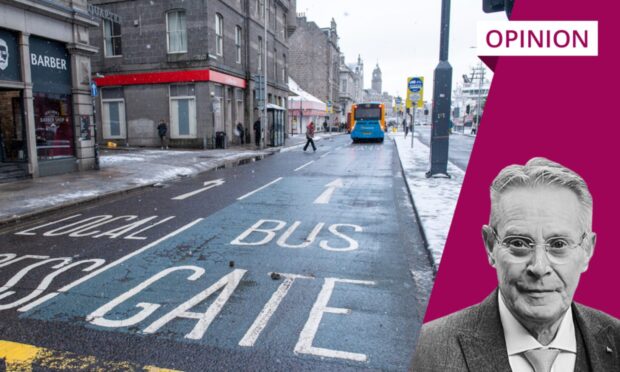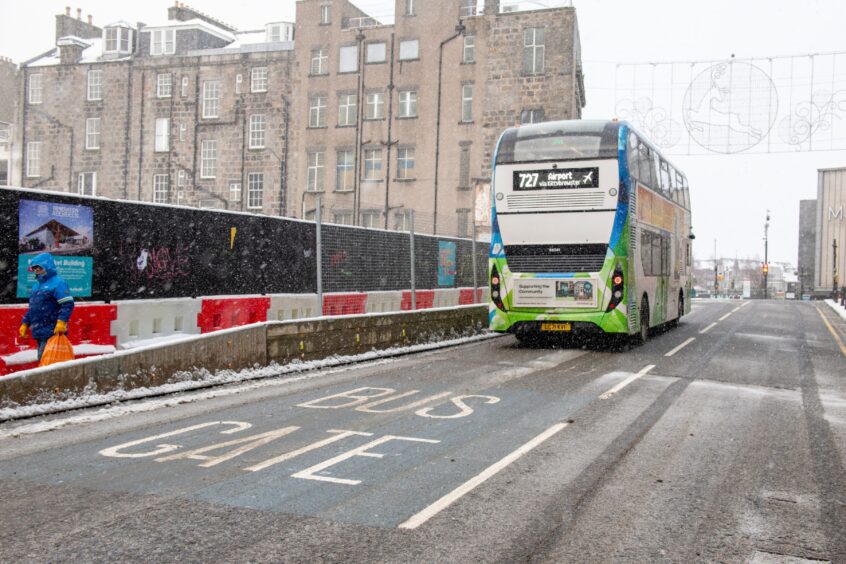Just a few days ago council leaders behind Aberdeen’s hated bus gates were hailing a re-birth of the city centre.
They were waxing lyrical about work on a major new food and drink market which is expected to revitalise Union Street.
Hear, hear; we’d all love to see it rise from the dead and flourish again
The market will be operated by McGinty’s Group, which has closed one of its other restaurants in Union Street – partly blamed on the bus gates.
It’s the biggest public works project around Aberdeen’s most famous street since its creation 200 years ago.
Why then, we might ask ourselves, did the city council tie a noose around the necks of important streets which surround it with the new bus-gate system – at the very same time as all this severe disruption?
It resembled a disaster waiting to happen, and it did.
Twenty-four hours after these pronouncements, jubilant businesses campaigning against the bus gates revealed they had reached their initial £35,000 appeal target to pay for a legal challenge.
The council should be embarassed
For a judge to analyse the complete process of implementation of the bus gates in every detail, and amid unfettered public scrutiny.
Numerous commercial benefactors and ordinary people dug into their pockets to offer cash support.
The curious thing was that McGinty’s Group was prominent among that list of leading bus-gate opponents backing the crowd-funder appeal.
So the company leading a council-inspired rebirth of the city through its new flagship market complex appears to support the notion that the authority is simultaneously strangling it with these bus gates.
I think that’s a reasonable interpretation for observers like me, and a sensible point of view to take by the company.
Does this mean that the bus gates are not only choking existing trade, but could also prevent the new market from reaching its full potential?
Should the council be embarrassed by this apparent deep contradiction over the two issues? McGinty’s stance should give them food for thought.
The council should pause and finally do the right thing by agreeing a credible compromise solution over the bus gates even at this late stage, before being dragged into court.
A previous rather feeble “compromise”, which involved restoring a right-turn sign, was torpedoed by vague yet menacing legal threats.
Trade plummeted and individual companies have struggled or gone to the wall since the new gates system was launched.
Only benefit to bonkers bus gates is that the buses now run on time
The restrictions ban most private vehicles from certain designated streets or drivers who fail to comply face hefty fines.
The only discernible “benefits” appear to be that the buses which now flood the space run on time and that a fabulously lucrative new income stream from fines has been created for the council.
Buses which might end up running through a ghost town at this rate; keeping pace with the tumbleweed, if they’re not careful.
In the process, the council has upset just about everybody – from confused and disorientated drivers who fall into these traps to businesses who have seen the city’s commercial wellbeing damaged.
An eminently reasonable and reputable coalition of businesses formed to seek a sensible compromise solution was dismissed out of hand by the council.
Has a local authority anywhere ever been as out of touch with its people?
I recall writing last year that Aberdeen should take inspiration from Inverness, which had just won a similar business-funded court battle with its council over traffic changes threatening to kill trade in one of its busiest streets.
In fact, Aberdeen campaigners went further than that and hired the same legal expert who scuppered Highland Council, which surrendered and scrapped its plans.
Now the Aberdeen campaign has sights set on raising almost £50,000 to provide extra muscle in court – to match the council, which will be presumably squandering a fortune in public council tax on its defence.
A forensic examination in open court of everything the council has done – and in full public view – is imperative in the interests of local democracy.
At the moment it appears more like autocracy.
Too many unanswered questions and suspicions.
The Inverness defence collapsed over incompetent public consultation.
In Aberdeen, there wasn’t any public consultation in advance.
They simply invoked obscure experimental traffic orders; was this an inappropriate use of powers to make such cataclysmic changes?
The council knew there would be public outrage as an earlier bus-gate trial-run was a disaster.
And then we have a mysterious melting pot of legal and financial advice the council has been keeping under wraps.
It all needs to be brought into the open for public perusal.
It shouldn’t have come to this; as one political critic said, “It’s bonkers.”
I hope the judge hearing this has a healthy pair of frontalis muscles (which control the eyebrows); they might face some heavy lifting as the details unfold.
David Knight is the long-serving former deputy editor of The Press and Journal


Conversation